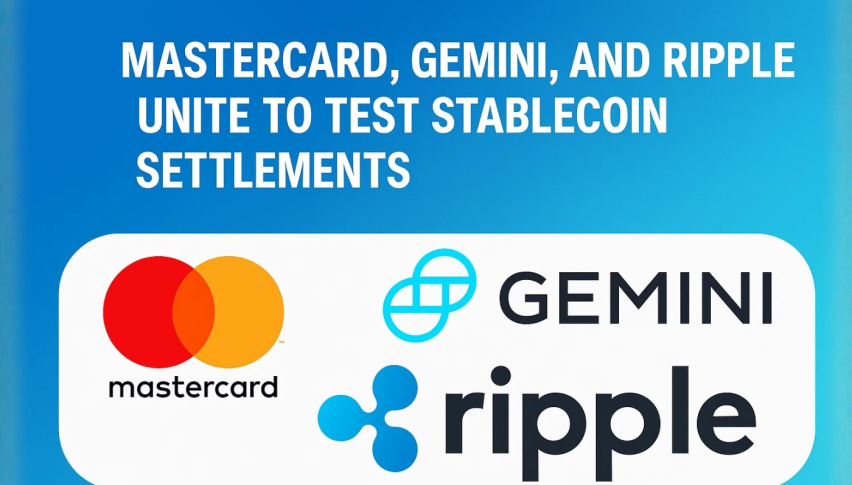Mastercard, Gemini, and Ripple Unite to Test Stablecoin Settlements
Mastercard is teaming up with Gemini and Ripple to explore a new way of settling fiat card transactions using RLUSD stablecoins...

Quick overview
- Mastercard is collaborating with Gemini and Ripple to settle fiat card transactions using RLUSD stablecoins on the XRP Ledger.
- This initiative represents one of the first instances of a regulated U.S. bank settling traditional transactions with a regulated stablecoin on a public blockchain.
- Gemini's credit card, issued by WebBank, aims to integrate digital assets into everyday spending while maintaining transaction speed and transparency.
- The partnership highlights Mastercard's commitment to bridging traditional finance with blockchain technology and expanding digital asset integration.
Mastercard is teaming up with Gemini and Ripple to explore a new way of settling fiat card transactions using RLUSD stablecoins on the XRP Ledger (XRPL). According to the companies, this marks one of the first collaborations where a regulated U.S. bank will settle traditional card transactions using a regulated stablecoin on a public blockchain.
A Step Toward Blockchain-Powered Payments
WebBank, the issuer of Gemini’s credit card, will play a key role in the RLUSD settlement initiative. The goal is to connect traditional banking with blockchain technology while keeping transactions fast, transparent, and regulated. Gemini, founded by Cameron and Tyler Winklevoss in 2014, already offers an XRP edition of its credit card through WebBank. “Through the Gemini Credit Card, we’re advancing the way that digital assets are integrated into everyday spending,” said Dan Chen, Gemini’s Chief Financial Officer.
Ripple Swell: We’re collaborating with @Mastercard, WebBank, and @Gemini to introduce $RLUSD settlement on the XRP Ledger for fiat credit card payments, starting with the Gemini XRP Credit Card: https://t.co/36yoNBtM9f
This initiative sets a new benchmark for institutional… pic.twitter.com/7UVhCTfuo0
— Ripple (@Ripple) November 5, 2025
The XRP Ledger, an open-source blockchain supported by Ripple, is designed to enhance payment efficiency through low-cost, high-speed transactions. Ripple continues to promote XRPL as a network capable of powering real-world financial use cases, and the use of RLUSD stablecoins could help move that vision closer to reality.
Expanding Digital Asset Integration
Mastercard’s partnerships in the digital asset space continue to grow. Earlier this year, the company worked with Chainlink to allow users to buy crypto directly onchain through secure fiat-to-crypto conversions. The firm’s growing network of blockchain collaborations shows its focus on bridging traditional finance with emerging decentralized technologies.
Gemini has also been expanding its crypto-linked credit card lineup. Last month, it launched a Solana edition offering up to 4% back in SOL token rewards on every purchase. By introducing blockchain-integrated cards, Gemini aims to attract more users and increase transaction activity through real-world spending.
In a separate announcement, Mastercard also revealed a partnership with Humanity Protocol, a digital identity solution provider. This collaboration will help users access credit, loans, and other financial services through open finance technology.
As Mastercard, Gemini, and Ripple continue to test stablecoin-based settlements, the initiative could redefine how traditional card networks and blockchain systems work together. Moreover, it signals a future where digital assets and fiat payments operate seamlessly side by side.
- Check out our free forex signals
- Follow the top economic events on FX Leaders economic calendar
- Trade better, discover more Forex Trading Strategies
- Open a FREE Trading Account
- Read our latest reviews on: Avatrade, Exness, HFM and XM


